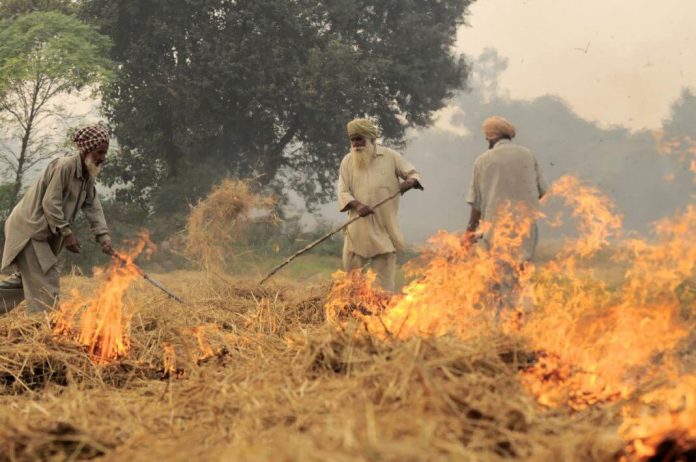The Supreme Court on Tuesday reprimanded the Punjab government over its failure to prevent stubble burning, considered one of the leading factors for air pollution in Delhi-NCR.
Noting that the farmers were being made a villain as they were not being heard in the court, the Bench of Justice S.K. Kaul and Justice S. Dhulia the farmers must be having some reason for doing this.
Directing the governments of both Punjab and Delhi to take strict action against the burning of agricultural waste, the Apex Court asked the Punjab government as to why can’t it make the process of crop residue 100 percent free.
The Bench observed that to burn the stubble, all that a farmer needed to do was a matchstick. Regarding the Punnjab government’s suggestion to distribute machines for the management of crop residue to farmers, the Court observed that even if the machine was given for free, there was diesel cost and manpower.
It further asked the Punjab government as to why it cannot fund diesel and manpower, along with utilising the byproduct.
It advised the State of Punjab to take a cue from the Haryana government in the manner in which financial incentives were given.
Noting that paddy was a water-intensive crop and that its cultivation was leading to the depletion of groundwater in Punjab, the Apex Court suggested that farmers engaging in stubble burning should be barred from receiving government subsidies and benefits, such as the Minimum Support Price (MSP) for paddy.
It directed the Punjab government to stop giving any benefit to farmers violating the law and further asked the State to impose fines on them. Noting that the stick must also follow the carrot, the bench said people violating the law should not get monetary benefits, adding that the government should hit the pockets of such farmers.
Asking the two AAP-ruled states to avoid politics and find a lasting solution, the Bench warned the governments of both Delhi and Punjab to either ‘act’ or ‘face consequences’.
Noting that the Punjab government has only been able to collect a small fraction of the fines (Rs 18 lakh) out of Rs 2.6 crore imposed on farmers for burning paddy stubble, the Apex Court directed the States to collect the remaining amount by the next hearing.
It further expressed its strong displeasure over the fact that out of the total fires reported in Punjab, fines were imposed only in 20 percent of cases.
The Bench further ordered the governments of Delhi and Uttar Pradesh to provide a status report on open waste burning.
Appearing for Punjab, State Attorney General Gurminder Singh said that there was a huge gap in imposing fines and incidents of crop fires. Out of 20,000, only 6,000 were fined.
The Bench noted that people who were lighting the fire had no representation in the Apex Court. It said in Bihar, the farmers cut it with their hands. It said people having sufficient holdings had enough incentive to monetise the agricultural waste through mechanised (harvesting).
Those with small holdings were struggling. It further said that large farmers found it an additional revenue source.
The Punjab AG sought instructions from the Supreme Court to direct the Union government to share some of the expenses for the initial cost of stubble baling machines for small farmers.
On being asked about the difference between big and small farmers, the Punjab AG said that those with small holdings of less than 3-4 acres were in majority.
The Apex Court recorded in its order that the upward trend in farm fires has not abated. It said total 984 FIRs have been lodged and the States AG has on instructions stated that they were against the landowners. Entries have been made against revenue records, it added.
The Supreme Court further directed that a commission led by the Cabinet Secretary would investigate the non-implementation of colour-coded labels on vintage vehicles and devise improved methods of compliance. It said the committee would look for solutions.
The Cabinet Secretary was directed to hold an immediate meeting with all the stakeholders involved, including the local station house officer, the Chief Secretaries, and the Directors General of Police governing these states.


